Does anyone know that the Brujan Das was the first Pakistani who swam through the English Channel on 6th August 1958 in about 14 hours, 25 minutes. Did you also know that Brujan Das’s achievement was celebrated in Pakistan with a national Holiday?
Did you know know that on 11th November, 1949, fishermen from Baba Bhit Island, Karachi captured a whale which was weighed between 15 and 21 Tonnes and 41 ft long and 23 ft wide. This record was listed in the Guinness Book of World Record till 1988 as one of the largest catch.
Do you know who was the first Pakistani sportsman who modeled for an advertisement?
If you don’t and want to know all about Pakistan, you should read this amazing book titled “Pakistan Chronicle” by Aqeel Abbas Jafri.
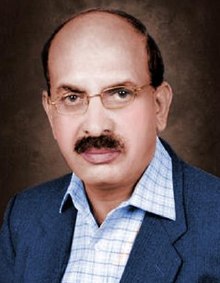 Aqeel Abbas Jafri is a history aficionado, a poet to whose credit are the scripts of PTVs current affairs shows such as Neelam Ghar, TV Encyclopedia, and Saat Din. He has written books on current affairs including “Pakistan Kay Siaysi Waderay” and “Pakistan Ki Intikhabi Siyasat.”
Aqeel Abbas Jafri is a history aficionado, a poet to whose credit are the scripts of PTVs current affairs shows such as Neelam Ghar, TV Encyclopedia, and Saat Din. He has written books on current affairs including “Pakistan Kay Siaysi Waderay” and “Pakistan Ki Intikhabi Siyasat.”
His recent book “Pakistan Chronicle” is a fruit of his 20 years of passion for interesting historical facts. Dedicated to Quaid-e-Azam Muhammad Ali Jinnah, the chronicle starts from 14th August 1947 and ends at 31st March 2010. In this chronicle for each day, he has documented various events related to complemented with very rare photographs of the people, political, sports and miscellaneous events, advertisements, etc.
For this he had to spent 20 years in libraries collecting information on 5,000 events, 4,000 rare photographs, studying the archives of old newspapers such as Jang and Dawn and almost the last five years in front of the computer. At the same time he also found a number of factual errors and he made an attempt to correct those so much so that he had to go to graveyards to find out the exact dates of what happened when. For example, the date of Pakistan’s first movie was August 8th, 1947 although in most references it is mentioned as August 1948. Another interesting instance of factual correction was recently a movieclip was played on a TV News Channel Dunya claiming that our current Pakistani President Mr. Asif Zardari acted in that movie called “Salgirah.” This book corrects it as well since it was not Salgirah but it was Manzil Door Nahin.
There are speeches of Late Ghous Buksh Bizenjo in the Kalat Assembly on the issue of accession to Pakistan helped in understanding the views of the Baloch nationalists on the current insugency in Balochistan. The most interesting and inspiring incident which should send chills to the hawks on both India and Pakistan side is the incident at the scout Jamboree which was held in Paris in 1947. As it coincided with the Independence, the group heard the India’s independence through the French media, they decided to make two separate flags. During that Jamboree Muslims and Hindus of the same “Indian Delegation” raised two separate flags. The cloth with which the Pakistani flag was prepared was taken from the Turban of a Hindu member and the Pakistan flag was hoisted by a Indian Hindu and the Indian flag was hoisted by a Pakistani Muslim.
Facts and figures with an actual photo makes this book a very comprehensive book on the history of Pakistan. Another facinating thing is that it includes various old newspaper advertisments. PIA advertisements, Lux soap advertisments featuring the heroines such as Suran Lata, Noor Jehan, Musarrat Nazir, Shamim Ara and others are also include in here.
Here are some other interesting facts from the book:
- Radio Pakistan made its first announcement on the night between 14th and 15th August 1947 and not on 13th and 14th August.
- Also viewing the 1959 ad of Brylcream shows that famous Pakistan cricketer, late Fazal Mehmood was the first Pakistan player who did modeling for a newspaper Ad.
- Karachi’s famous Metropole Hotel which was the center of activities in 1960s and 1970s published an ad showing that the Shah of Iran stayed there.
Referencing is made easier by dedicating a quite a few pages at the end for index, a rare thing in Urdu book publishing. Generally most Urdu Books don’t use good quality paper and also they have a smaller size. This book is published in a Coffee Table Book size with good quality paper. I would hope to see an English version of this book and I know that the author has plan to pursue so that it can be shared with the international community.
I would like to end the post with Dr.Rauf Parikh’s review of Pakistan Chronicle in Dawn. This has even more fascinating details from the book.
The word ‘jharloo’ is now commonly used in Urdu/Punjabi slang to express electoral rigging. But the question is: Which was the first rigged election in Pakistan? The answer: It was the Punjab provincial assembly election held from March 10 to 20, 1951, which saw the massive rigging and the results, too, were manipulated in favour of Muslim League candidates, according to Aqeel Abbas Jafri.
Why did the Quaid-i-Azam dissolve on August 22, 1947 the then NWFP provincial government headed by Dr Khan Sahib (Khan Abdul Ghaffar Khan’s elder brother)? What were the early signs of trouble in Balochistan and how we mishandled the issue and alienated betrayed the Baloch people? When did the first suicide bombing take place in Pakistan? Which was the first movie made in Pakistan? Who was the first Pakistani to scale the Mount Everest? When did Pakistan play their first cricket test match? These and replies to thousands of such queries are given in Aqeel Abbas Jafri’s new, informative and encyclopaedic Urdu book Pakistan Chronicle.
Though it gives a chronological account of important events in the history of Pakistan and Jafri is known for his encyclopaedic knowledge, quiz books and quiz programmes, it is by no means a quiz book. Modelled on the famous Chronicle of the 20th century (Longman, 1988), it is a day-to-day, matter-of-fact, succinct and brisk account of the important events that took place in Pakistan right from August 14, 1947 to March 31, 2010 — till a month before the book was brought out.
The book presents all major events in a way that makes one feel that one is reading important newspaper clippings. The events that took place in a specific month of a calendar year have been given in a separate section. Comparatively less important events are briefly listed in a separate box. Obituaries have been allocated a separate column. What makes this monumental work all the more commendable, in addition to over 4,000 pictures (many of which are extremely rare), is that Jafri has a special talent to narrate vital facts, taking care of all important aspects, in minimum words and in correct language. This, perhaps, is a gift from his years of hard work on quiz books, quiz-programme script-writing as well as his penchant for journalistic work. The 1,080-page Pakistan Chronicle records some 5,000 important events in the fields of politics, literature, music, painting, architecture, science, journalism, show business, trade, industry, sports, advertising, philately etc. A brief history of Pakistan unreels itself before the readers’ eyes in the shape of brief, crisp and authentic accounts taken from leading newspapers of the country.
Posters of newly-released Pakistani movies, images of new Pakistani postage stamps, title pages of new important books and magazines and mini replicas of selected advertisements published during all these years are part of the book. With these images, one can draw an outline history of Pakistan’s achievements and progress in these fields.
Another feature is the rare photographs of some famous — and infamous — personalities and the account of historic events concerning them or feats achieved by them. The list of such persons and events includes: Maulvi Tameezuddin Khan, Justice Mohammad Muneer, Bhoopat Dakoo, Basheer Saarbaan and scores of others.
Writing a book in our society is a thankless job and usually the writer has to put in a lot of time, money and labour without much hope of getting any return. It’s same with this book. Jafri has been collecting material for the book for years and had been working on it for some 20 years. He probably won’t get much out of this book but, a Pakistani to the core, he has dedicated the book to the Father of the Nation, Quaid-i-Azam Mohammad Ali Jinnah. Summarising the entire work, he says: “The book is a gift to the country and the generation that loves it and dreams of a splendid future and a glorious Pakistan.â€
With its old photographs and accounts of historic events, the book will give you some nostalgic feelings. It will, at times, make you feel proud to be Pakistani citizens with the accounts of great achievements that we as a nation have accomplished. And at times, it will make you feel like weeping when recalling the historic blunders or the woeful tales of moments of shame. It is a peep on Pakistan’s hall of fame and hall of shame.
Published jointly by Fazlee Sons and Varsa, Karachi, ‘Pakistan Chronicle’ deserves appreciation for high production standards as well.
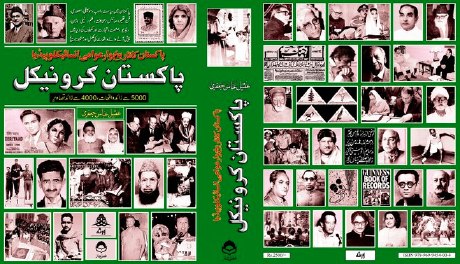
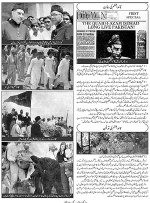
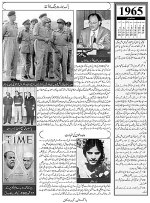
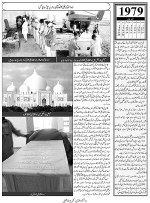



















































On page No. 397 of Pakistan chronicle it has been mentioned that on 30th June 1974 the bill to declare qadiyani as Non Muslim was presented under the leader ship of Mufti Mehmood. While according to News papers this bill was presented by Molana Shah Ahmad Noorani, Parliamentary Leader of Jamiat Ulma-e-Pakistan. The date of Rabwa incident is also not mentioned in chronicle which is 29th May 2011
There is a mistake in this review. I mentioned in my book that the first Pakistani film ‘Teri Yaad’ was released on 7 August, 1948 while the all other film sources including Yasin Gorija and Mushtaq Gazdar wrote that this film was released on 2 September, 1948.
Some interesting details of Teri Yaad can be watched on the following link:
http://mazhar.dk/film/60years/movies/TeriYaad.htm